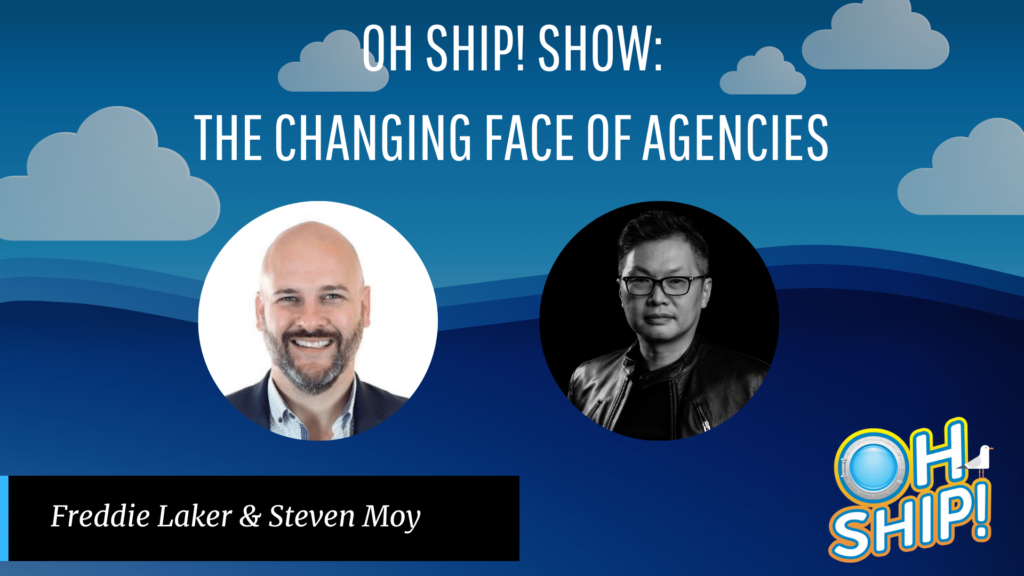Learn about digital agency culture, its shifting role and tactics, and how it’s quickly evolving in today’s climate of disruption.
Steven Moy, CEO of Barbarian and former CEO of Isobar UK, has a lot to say about the changing face of the modern digital agency. In today’s climate of disruption, agency culture, roles, and tactics are rapidly evolving—and success means embracing fearlessness and simply diving in. Read on for his perspectives on what the future of the agency business model holds.
Why Is Today’s Agency Evolving So Quickly?
People often talk about efficiency, efficacy, and scalability, but success hinges on innovation, Steven asserts. In today’s climate of disruption, innovation can allow agencies to not only prevent extinction but leapfrog their competition into new territory.
“The first question is: ‘How do you identify new territories, new business models, or new areas for the brand to explore?’” he says. Essentially, agencies need to get serious about solving business R&D to figure out what’s next.
Today’s client is demanding a new type of digital agency to unlock growth in new areas of innovation, Steven continues. Though ecommerce has been two decades in the making, people are more open to trying new things now—because they have to be.
A great agency can push a client to innovate at the speed necessary to succeed by finding new opportunities for synergy within a business while bringing in their own creative thinking. Informed by working with brands from around the world, they can quickly assess whether an idea is worth pursuing. They have the agility and the vision to generate groundbreaking ideas in collaboration with clients. Let’s take a closer look at how they’re doing it.
How Are Successful Agencies Reaching Customers?
This begins with building an ecosystem connecting all the data together, which drives the shaping of the brand and its relationships with consumers, Steven explains.
The next frontier is making an emotional connection with the audience. Since brands no longer need a physical store, the playing field has been leveled, meaning success hinges upon their ability to make an authentic connection. “I think we need to go back and ask: How do we build brands? How do we connect on an emotional level so people will buy our stuff?” Steven emphasizes.
“I think D2C, direct to consumer, is a new imperative for any boardroom right now,” he continues. “All the brands should have a direct conversation with the consumer.”
How can a brand make this connection?
Using more digital touchpoints
Brands must grow proficient in using the array of technologies (like iPad) and platforms (like TikTok) that foster an immediate connection with consumers. Through these digitally-enabled touchpoints, brands can build direct relationships with consumers.

Further, don’t keep technological know-how in a silo. To build a strong customer relationship management strategy, knowledge of AI, machine learning, automation, and other tools must be widely shared among people in a range of roles. “You don’t have to be the system integrator or the superior technologist, but you have to understand what you’re doing,” Steven says.
Producing accessible products
Businesses had been speaking of digital natives in an elitist way prior to the pandemic, thinking of them as college-educated and affluent, Steven underscores. Now, we’re realizing that perception is highly skewed. Thus, many businesses may be missing an opportunity to connect with a massive base. A huge portion of the population earns an hourly wage and is a single parent; many don’t even have wifi at home to enable their children to attend school virtually, Steven asserts. He envisions solutions such as universal access to wifi designed to meet the needs of our diverse world.
All brands should ask themselves, “How can you really create something that is truly innovative for all to access?” says Steven. Visionary ideas can emerge from there.
Shaping a New Type of Digital Agency
The evolution of your business model and agency culture can propel these changes forward. Steven shares wisdom gleaned as a second-time CEO on how to steer your organization in the right direction.
Embracing the shifting role of the leader
Steven began leading Barbarian shortly before the pandemic began. Although in his first CEO position, he’d felt that people expected the CEO to have all the answers, in 2020, it was okay (and even crucial) to acknowledge that you don’t know it all. He learned to drop his ego in favor of leading by example and becoming a better mentor and coach. He also focused on listening to people to benefit from their deep knowledge of their daily work and drawing connections between disciplines.
Listen to both your team and your client because they are closer to the problem, Steven urges. “You don’t know what you don’t know; it’s fine. Acknowledge it,” he says.
Experimenting at speed

Experimental, trial-and-error culture is the new world order, Steven asserts. “I always have the philosophy, go try something out,” he says.
If someone thinks an ecommerce solution will take two years, they should think twice about it, he warns. There’s no time to let a good idea stagnate.
“I really want to be helping a client in a way that is more focused on transforming their business,” he continues. “I always believe that I can help a client create the future faster.” Barbarian’s relatively small and nimble setup allows them to experiment with new ideas while they’re fresh. Last June, Barbarian launched a membership week for American Express that they’d planned in just five weeks, for instance, putting out stellar content every day of the week.
Unleashing a new wave of collaboration
With a massive “Superdesk” that wraps around Barbarian’s entire office, giving everyone a seat at the table, it’s clear that Steven prioritizes collaboration. Here are three secrets to his success.
Mixing disciplines
To quickly identify new opportunities, businesses must bring together the most creative minds across disciplines, says Stephen. That’s the secret sauce of innovation. Be willing to pay a premium for specialists rather than having a team composed of only generalists, he advises.
Adopting a new definition of inclusion
“In our new culture, or evolving cultures, diversity is already part of our DNA—inclusion requires a new definition at work,” Steven asserts. “Inclusion means you have to listen and also allow everybody with different backgrounds, philosophies, and belief systems to have a shared voice.” Assembling a diverse team is a foundational step, but real learning occurs and innovative ideas arise through this cooperation coupled with equitable pay, Steven emphasizes.
Elevating the culture
Steven defines culture as a core set of values that help cultivate certain behaviors. “Culture is not static; it’s a dynamic component of the company. We want to create an environment where people can also collaborate and elevate the culture,” he says.
Barbarian’s key values include being entrepreneurial, innovative, and fearless, qualities they looked for in new recruits. They’re articulating a new world; no blueprint exists yet, so they needed people with the attitude that “if it doesn’t exist, we make it.”
Maintaining a closely connected culture had its challenges during the pandemic. Steven’s biggest Zoom Oh Ship! moment: Being the only participant in a town hall meeting he was supposedly leading. This taught him to better calibrate how to keep people engaged by choosing meeting topics more carefully. Fortunately, they’re now coming into the office a couple of days a week. But experiences like directing a photoshoot through videoconferencing pushed them to focus on thoughtful preparation and clear expression—skills that remain indispensable even when they’re sitting at the Superdesk together!
Did you enjoy this post? Subscribe and listen to the Oh Ship! show for more great insights!





